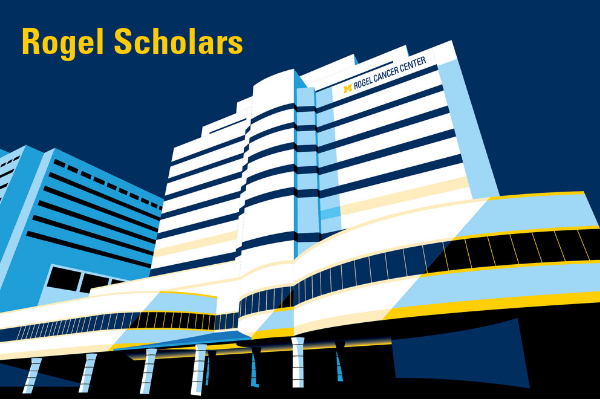Rogel Cancer Center names 14 inaugural Rogel Scholars
Media contact: Nicole Fawcett, 734-764-2220 | Patients may contact Cancer AnswerLine 800-865-1125
Fourteen University of Michigan Rogel Cancer Center researchers will have the opportunity and freedom to pursue new directions in their work. These faculty members comprise the inaugural class of Rogel Scholars, a select designation with research support funded as part of a $150 million commitment from Richard and Susan Rogel.
“We are excited to move forward with this first initiative funded by Rich and Susan Rogel’s generous gift. The Rogel Scholars program will provide the kind of support that allows our exceptional researchers the intellectual freedom to take risks and develop new and innovative approaches,” says Eric R. Fearon, M.D., Ph.D., director of the Rogel Cancer Center.Each Rogel Scholar will receive $50,000 per year for three years, with potential for additional support.
“It’s an important goal of our cancer center to be able to support our innovative faculty as they think creatively about how to improve our understanding of how to prevent, detect and treat cancer. We hope this funding will advance knowledge and new approaches to take on cancer, generating data needed to obtain external research funding support,” Fearon says.
In 2018, Richard and Susan Rogel committed $150 million to the University of Michigan’s cancer center, which was renamed the Rogel Cancer Center. The Rogel Scholars is one of seven programs to be funded through the gift. The programs focus on improving treatment and care for cancer patients, helping to develop promising scientists, and leveraging the university’s broad and deep strengths in science, innovation and patient care. Additional programs will be rolled out over the next several years.
The Rogel Scholars are:
- Maria Castro, Ph.D.: Understanding the tumor microenvironment and immune system in brain tumors
- Jolanta Grembecka, Ph.D.: Development of small molecule inhibitors of proteins involved in cancer
- Steven Katz, M.D., MPH: Understanding the impact of genetic risk evaluation and management on cancer treatment decisions
- Judith Leopold, Ph.D.: Designing and developing small molecules to inhibit cancer
- Mats Ljungman, Ph.D.: Exploring the role of the RNA exosome as a target for cancer therapy
- John Magenau, M.D.: Developing clinical strategies to improve the safety and efficacy of blood and marrow transplants for treatment of blood cancers
- Sami Malek, M.D.: Uncovering biomarkers and new pathways to create novel treatments for leukemias and lymphomas
- Sofia Merajver, M.D., Ph.D.: Identifying and targeting factors that make cancers highly aggressive
- Rafael Meza, Ph.D.: Characterizing the impact of cancer prevention and control interventions to inform policy and improve health
- Bhramar Mukherjee, Ph.D.: Developing new methods to analyze large scale epidemiologic data
- Sunitha Nagrath, Ph.D.: Developing technologies to establish liquid biopsy for early diagnosis of cancer and early detection of recurrence
- Marina Pasca Di Magliano, Ph.D.: Understanding the role of the tumor microenvironment in pancreatic cancer
- Tycel Phillips, M.D.: Testing new therapeutic approaches in clinical trials for patients with lymphoma
- Yatrik Shah, Ph.D.: Understanding how low oxygen levels activate genes involved in metabolism, cell survival and iron metabolism in cancer
Learn more about the Rogel Scholars.

